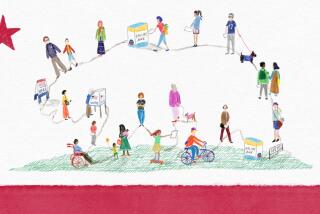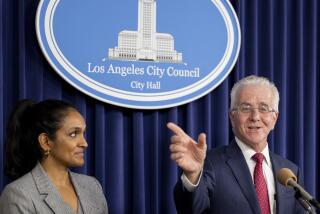Opinion: Change election day in L.A.? Not so fast.
Hoping to avoid a repeat of last year’s dismal mayoral election, when only 1 in 4 registered voters in Los Angeles bothered to cast a ballot, a citizens commission has recommended moving municipal elections to coincide with presidential and gubernatorial elections.
The idea, according to a report from the Los Angeles Municipal Elections Reform Commission, is to capture more voters by pairing city elections with the more high-profile contests. City elections are now held in March and March in odd-numbered years. The commission recommended moving them to June and November in even-numbered years.
Experts consulted by the commission were unanimous: Changing the date of municipal elections is the only structural change that would lead to a significant increase in voter turnout. Participation increased 21% to 36% in cities that held their elections concurrent with a presidential or gubernatorial election, according to a Public Policy Institute of California analysis.
Sounds great, right? But there is at least one major drawback to concurrent elections.
Though turnout in presidential elections is typically three times greater than in the municipal elections, and turnout doubles for gubernatorial elections, the cost of running for office also increases significantly during those periods.
Pick your poison. Do you prefer the low turnout of off-year elections? Or do you prefer more expensive campaigns that will require candidates to raise more money?
City candidates would have to compete with state and federal campaigns for news coverage. What’s more likely to end up on the evening news or the front page, the race to lead the most populous state in the nation or the showdown in L.A. City Council District 15?
With little news coverage, candidates would need to buy more airtime to get their messages out. With so many local, state and federal races underway, there would be greater competition for television and radio advertising, which would push up the cost. Local candidates would need to raise more money to afford advertising space, or simply to get their message heard amid so many other political campaigns.
That means more fundraising, more reliance on political action committees and more money in politics — just the kind of activities that turn off many voters and make average people feel like their concerns don’t carry as much weight as the concerns of special interests and big campaign donors.
I’m not sure this is a fatal flaw. But L.A. leaders should certainly consider it and look at ways to counteract the potential for pricey campaigns, perhaps by expanding the public financing program or improving the city clerk’s voter education. (Former candidate for secretary of state Derek Cressman proposed creating a state online voter guide with candidate videos, footage of debates and campaign contribution data.)
It would be a shame if the quest to get more people to vote in L.A.’s elections ended up increasing the influence of money in politics and undermining public trust in the political system.
More to Read
A cure for the common opinion
Get thought-provoking perspectives with our weekly newsletter.
You may occasionally receive promotional content from the Los Angeles Times.







